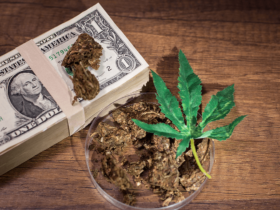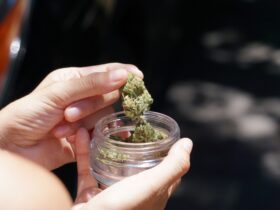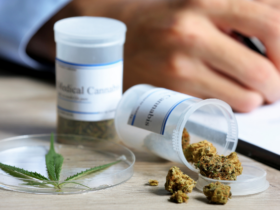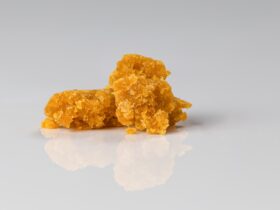
Delta-8 THC | Source: Unsplash
Delta-8 THC has been getting all of the buzz as of recently due to a loophole found in the 2018 U.S. Farm Bill that essentially legalized all cannabis products that are derived from hemp.
An important thing to know when it comes to cannabis is the presence of molecules called Cannabinoids. Cannabinoids (ie, CBD, CBN, THC, CBC) are chemical substance that bind to the cannabinoid receptors in our body and brain, influencing specific effects based on the particular cannabinoid. Cannabinoids can be converted into other cannabinoids through chemical reactions. Today, we will be talking about one in particular called Delta-8 THC.
Delta-8 THC, also known as D8 THC, can be synthesized from delta-9 THC but is most commonly synthesized from cannabidiol (CBD) by a process called decarboxylation. Decarboxylation involves the removal of a carboxyl group from the CBD molecule. This process can be carried out using heat and pressure, or by reacting the CBD with a chemical agent such as an alkali or an acid.
After the decarboxylation reaction, the resulting compound can then be converted into D8 through a series of chemical reactions. This process may involve isomerization, distillation, or extraction, as described in my previous response.
It’s important to note that CBD and delta-8 THC are two different compounds that have different effects on the body. While CBD is non-psychoactive and has been shown to have a variety of potential therapeutic benefits, delta-8 THC is a psychoactive compound and can produce a high when consumed. As such, the synthesis of D8 THC from CBD is typically carried out in a laboratory setting, and is not something that can easily be done at home.
While D8 THC is similar to delta-9 THC in many ways, it is known to be less psychoactive and to produce a more clear-headed and functional high. This makes it an attractive option for those looking to experience the potential therapeutic benefits of THC without the intense psychoactive effects.
Delta-8 THC is also being studied for its potential medicinal benefits.
Some research suggests that it may have anxiolytic, antiemetic, and appetite-stimulating effects, and may be useful in the treatment of conditions like anxiety, nausea, and cancer-related cachexia.
Despite its potential benefits, delta-8 THC is not legal in all states and countries. In states where it is legal, delta-8 THC can be found in a variety of products, including tinctures, gummies, and vaporizers.
It’s important to note that delta-8 THC is still a largely unregulated compound, and there is limited research available on its safety and efficacy. As such, it is important to be cautious when using delta 8 THC and to only purchase products from reputable sources.
Delta-8 THC shows lots of promise.
After gaining so much recognition in the cannabis industry for its potential therapeutic benefits, Delta-8 is has swiftly risen to the top of known cannabinoids. While more research is needed to fully understand its effects and potential risks, it is an exciting development in the field of cannabis science.




























Wow, awesome blog structure! How lengthy have you been blogging
for? you make blogging look easy. The full look of your
web site is magnificent, as well as the content material!
You can see similar here sklep online
An impressive share! I have just forwarded this onto a coworker who had been doing
a little homework on this. And he in fact ordered me
breakfast simply because I stumbled upon it for him… lol.
So let me reword this…. Thanks for the meal!! But yeah, thanx for spending the
time to talk about this matter here on your website.
I saw similar here: Dobry sklep
Hi! Do you know if they make any plugins to assist with Search Engine Optimization? I’m trying to
get my blog to rank for some targeted keywords but I’m
not seeing very good gains. If you know of any please share.
Cheers! You can read similar article here: Dobry sklep
It’s very interesting! If you need help, look here: ARA Agency
Hi! Do you know if they make any plugins to help with Search Engine Optimization?
I’m trying to get my website to rank for some targeted keywords
but I’m not seeing very good results. If you know of any please share.
Many thanks! You can read similar art here: AA List